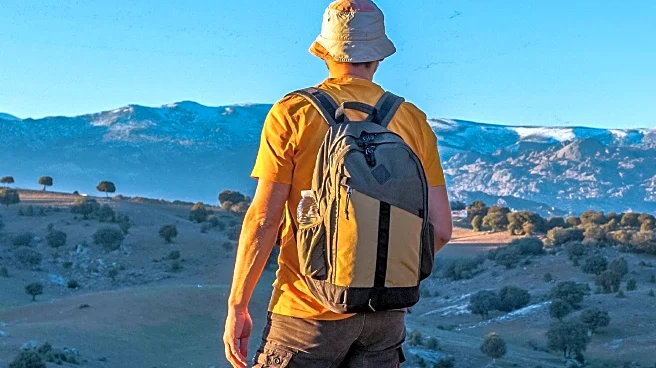What's Happening?
Dr. Rob Scanlon, an expert in internal medicine and critical care, has published a new book titled 'Surviving the Trail,' aimed at educating hikers on preventing common emergencies during hikes in Southern
California. The book emphasizes preparation and awareness to avoid situations that often lead to search and rescue missions. Scanlon's guide outlines five essential skills to help hikers navigate dehydration, perilous weather, river crossings, falls, and getting lost. He stresses the importance of planning hydration needs, understanding weather forecasts specific to hiking areas, and employing safe techniques for river crossings. The book also highlights the dangers of social media-driven risky behaviors in high places and provides extensive guidance on land navigation to prevent getting lost.
Why It's Important?
The publication of 'Surviving the Trail' is significant as it addresses the increasing number of hiking-related emergencies in Southern California, a region known for its diverse and challenging terrains. By equipping hikers with practical skills and knowledge, the book aims to reduce the frequency of rescue missions and enhance the safety of outdoor enthusiasts. This initiative could lead to a decrease in emergency incidents, thereby reducing the strain on local rescue services and promoting responsible hiking practices. The book's focus on preparation and safety is crucial for both novice and experienced hikers, potentially influencing public policy on outdoor safety education and awareness.
What's Next?
The release of Scanlon's book may prompt further discussions among hiking communities and local authorities about improving safety measures and educational programs for hikers. Outdoor organizations and hiking clubs might incorporate the book's teachings into their training sessions and workshops. Additionally, Scanlon's insights could inspire similar publications or initiatives aimed at enhancing outdoor safety across other regions. As the book gains traction, it may also lead to collaborations with local parks and recreation departments to promote safe hiking practices.
Beyond the Headlines
Beyond immediate safety concerns, Scanlon's book touches on broader cultural implications, such as the impact of social media on outdoor activities. The emphasis on avoiding risky behaviors for the sake of social media validation highlights a growing trend that could influence how society views and engages with nature. This cultural shift towards prioritizing safety over sensationalism may foster a more responsible and sustainable approach to outdoor recreation, encouraging individuals to appreciate nature without compromising their well-being.












